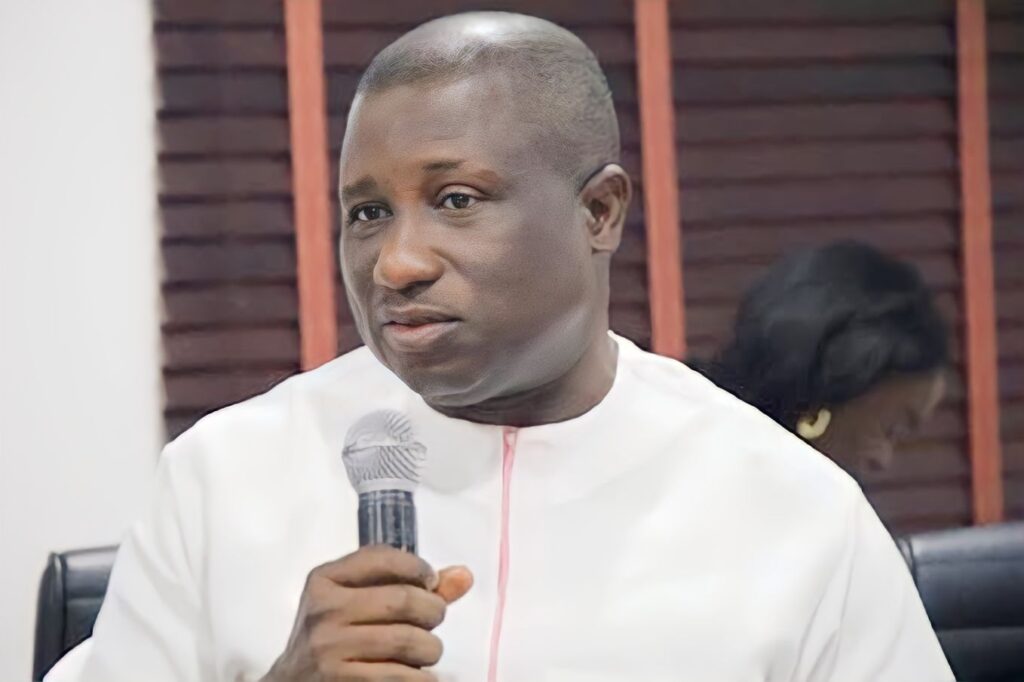The Chairman of the Nigeria Premier Football League, Honourable Gbenga Elegbeleye, speaks to Nurudeen Obalola on a variety of issues, including the progress the elite league has made during his tenure, the challenges, the desire to attract big investors, players’ and referees’ welfare etc…
The new NPFL season kicks off fully this weekend, how prepared are you for the campaign? Any hitches, problems?
We’re fully ready. That’s why we were able to start last Saturday with the match at the Cathedral in Enugu. If we weren’t ready we wouldn’t have been able to start. Asking about hitches, yes there will always be challenges and hitches.
There were hitches before and there will be issues. These are meant to be resolved. We had issues, tackled them and solved them. There will always be issues.
Nigerian football is not an environment you want to navigate without issues. You just have to face them and ensure they don’t stop you from reaching your objective.
Also read: NPFL: Enyimba, Remo Stars, Tornadoes win away, Rivers United hold Insurance
What should we look forward to this new season? Last season was largely successful, any innovation for the new campaign?
Last season was adjudged to be successful and we want this season to be even better. Every season we need to introduce new things. For the very first time in our football history we were able to fix a date for the kick-off of the league and we stuck to it.
For the first time we started our league in August. Like I said during the IMC (Interim Management Committee) period, the very first season when we had the abridged league, in Nigeria we should make sure we align our league calendar with those of CAF and FIFA.
Before now, the Nigerian league could start at any time, it could be January, it could be December, it could be May. There was no particular schedule.
We just have to be starting our league in August like the developed leagues and we’ve achieved that successfully.
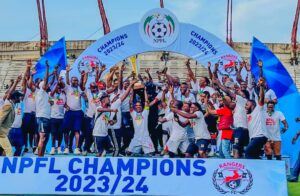
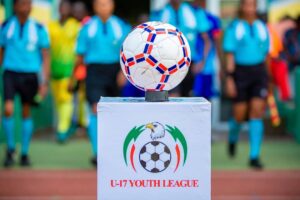
Of course, so many brick walls to dismantle before we can achieve this. But again last season we introduced the NPFL Youth League where we made sure that all the Premier League clubs must have feeder teams like it’s done in advanced football leagues.
We had the Youth League competition with five zones: Nasarawa, Kaduna, Enugu, Port Harcourt and Ado Ekiti. From there we had five zonal champions, who converged in Benin where Rivers United won the competition.
From the competition we were able to pick the best of the players, 38 of them, to come to camp here in Abuja.
We camped them at the FIFA Goal Project. We were able to get the best of them that we’ll take to Spain because we have an agreement with Sevilla Football Club that we’re bringing in 18 to 20 players.
This agreement means every season we take the best of our under-17 boys to them to train. Then they come back. They will play friendly matches there and one or two coaches will follow them.
Those coaches again will be trained. Those boys, while playing friendly matches, may get teams that will be interested in them. The idea is to make Premier League clubs look less to government for finances.
They should be innovative. In the European market, they want younger players. Once you go there, one or two of your boys can get clubs. Imagine a players getting a market value of €500,000. Convert that to naira, that’s over a billion.
When a club has such opportunities they do not need to go to government that season to beg for money. That’s what we want. Football is commercial. It’s supposed to be generating money.
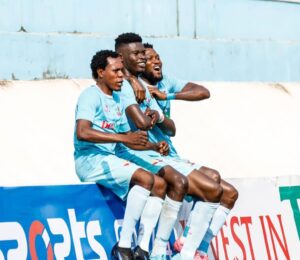 Again this season, we’re introducing communication gadgets. Already we used it in Benin. Instead of the referee leaving the centre to go talk to AR1 or AR 2 to start asking ‘what’s happening, what do we do’, he stays where he is and communicates directly like we’re seeing in Europe.
Again this season, we’re introducing communication gadgets. Already we used it in Benin. Instead of the referee leaving the centre to go talk to AR1 or AR 2 to start asking ‘what’s happening, what do we do’, he stays where he is and communicates directly like we’re seeing in Europe.
So we’ve started using that one now. This is a prelude to getting our football into the VAR system. We had meetings with organisations that produce VAR and what they told us was first we must have this kind of system with communication gadgets.
Then we must train referees on how to use the VAR machine. We’re on the verge again of training those people.
Kudos to the NFF, they produced those communication gadgets and now the referees know how to use them. Then we can start using the VAR. We have other innovations but this is the summary for now.
Communication gadgets, VAR systems etc all cost a lot of money. Are you satisfied with the NPFL revenue from last season? What are the projections for this season?
No, it’s far from satisfactory. But let me tell you, as at then when we started as the IMC, we didn’t inherit any money.
There was no account, not even an envelope or a piece of paper or a biro or typewriter. This is to say we inherited nothing. Not even an office space.
We started from ground zero. But we were able to convince the GTI Group, and we had an agreement. First, we discovered that three years preceding our coming into the system, Nigerian referees were not paid.
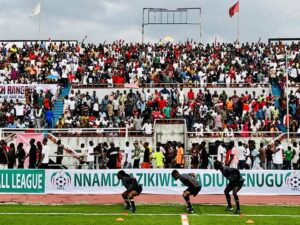 And you can imagine a system where you don’t pay referees, then the league can never be viable.
And you can imagine a system where you don’t pay referees, then the league can never be viable.
Our league was not attracting corporate bodies because you could predict the winner of every match of the Nigerian league before. Home teams won almost all the time because the home team would take out the referees, accommodate them and give them money to do their bidding.
We now told GTI we don’t want such. So we have to pay our referees. The money they were not paid before, they asked for it. We said no, we cannot pay you for those three years you said you were not paid. Because you as a referee you cannot leave Aba to go to Maiduguri to officiate without being paid. Will your family not ask you questions? What kind of a job is that?
Naturally, there must be something that you’re getting discrediting the system. So we didn’t agree to pay that one, but we agreed to pay every time you go to officiate now. A day before, we’ll credit your account and we’ll double what you’ve been paid before. And that’s what we did. GTI was able to grant that, pay all staff salaries, then we were able to start.
The truth is GTI gave us a footing to get up. Then we had StarTimes. They paid last season and again we are still looking forward to their payment this season. We want more corporate partners and investors.
But for us to have partners and investors, we must have a league that is credible and trustworthy. We also have the Propel Group. What they do is as you’re talking on this smartphone now, you can watch six or eight of our live matches in about 102 countries across the world now..
We started that since last season. They’re commercial partners too because they’re supposed to generate money. We’ve been able to generate little but it’s not enough. We promise to step up this season.
I’ll say it’s been challenging so far, but it’s quite okay. We will continue to fight until we get better results.
You mentioned GTI. When the arrangement was announced, it raised some eyebrows. What are you telling those that had doubts about the arrangement?
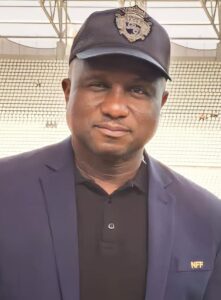 Those eyebrows raised, I’m aware that people do not know that the league can be viable. When GTI came, where were those people when the league was not even having any sponsors at all?
Those eyebrows raised, I’m aware that people do not know that the league can be viable. When GTI came, where were those people when the league was not even having any sponsors at all?
Years before we came in, nobody was interested in the league to partner them the way GTI is doing now.
Those who raised eyebrows, please tell me, a company that raised over N1 billion on the league in their first season and we said if we agreed together when we have sponsors we’d sign a 10-year agreement with you.
The only percentage you’ll take from income coming in from sponsors is only five percent. Please tell me, assuming they’ve spent over N2 billion now, the league has not got N2 billion from any source. And yet we’ve done two seasons.
How do you expect them to recoup their money? I remember one of us on the board of IMC said it was a waste of time for them to be giving us money. We have people raising eyebrows, they should come out and say these are the things they’re against.
The club chairmen said they wanted to see the GTI contract. Of course, they saw it. They looked at it and okayed it. Some clubs are even earning more.
Before, it was 45 percent revenue going to the club, now it’s 60 percent of any revenue we have going to the clubs. Where are the eyebrows? Those eyebrows better close permanently.
Also read: GTI assures NPFL fans of global TV coverage
Remo Stars are like the model club with their own stadium and well-run academy. Is that the standard you’re aiming for the other clubs?
A particular club out of 20, that means the rest need to follow suit. That’s what we’re trying to do. Only one club out of 20 is commercially viable. Does that make any sense?
How do you get the other clubs to Remo Stars standards? Of course it’s not just you, they must do their part…
I’m happy you mentioned Remo Stars. The club is owned by an individual and his wish is to make profit. The rest of the clubs are owned by government.
These clubs have not been making money like Remo Stars. The Remo Stars owner (Kunle Soname) has been investing his own money. He doesn’t want to fail. He’s putting in all his energy and resources to get standard best practices to make his club viable.
Others are even making money from academies, why are clubs owned by government not making money? That’s why everybody needs to sit down and ask questions. That’s why we’re advocating for government to divest from the football business.
Football is a commercial venture. Government should realise this. If government insists on owning football clubs, they should operate a system in which the clubs make money.
Talking about Remo Stars, are you not worried that the other privately-owned clubs, Sporting Lagos and Doma United, got relegated?
Doma was topping the league at one stage last season but lost their way. I wouldn’t know what happened, maybe management issues.
But as for Sporting Lagos, they brought a lot of swag into our system. At their stadium you see corners for soft drinks, small chops, like it’s happening in Europe.
Those are the things you want but, unfortunately, they lost on the last day of the season and got relegated. They came into the environment like they were testing the waters. I’m sure they’re coming back.
On relegation and promotion, how did Heartland, who finished lower than Sporting Lagos and Doma United, end up taking up Beyond Limits’ spot?
Only Heartland showed interest. Sporting Lagos opted to stay back in the NNL and work their way back to the NPFL. They want to fight their way back. That was it.
Rangers and El-Kanemi could not play their CAF competition matches because of sub-standard facilities.
We’re still on the same thing about government owning football clubs. Remo Stars play their matches at home because the owner has made sure that his facility is up to date and up to the standards of CAF. Remo Stars Stadium passes the test of CAF.
El-Kanemi cannot do that because their stadium in Maiduguri is owned by government. The one in Enugu is owned by government. You even see Enyimba playing in Uyo. So every club that does not have the capacity to satisfy CAF’s facility requirements will have to go elsewhere. And where is the elsewhere?
In Nigeria we only have Uyo to go to, I’m sorry to say. It’s owned by government too, built by the former governor. We want other governors to emulate that. Recently, the governor of Oyo State promised to upgrade the Liberty Stadium Ibadan to that standard. If that one is done, it will be another opportunity for our clubs.
The only thing barring Enugu stadium is that the turf is Asto turf and CAF prefers grass. With grass or hybrid, the stadium will be good enough for CAF competition.
Remo Stars and El-Kanemi have already been knocked out of CAF competitions at the early stages and NPFL champions Rangers barely scraped through against a club from Comoros despite playing both legs in Uyo. Are you concerned that these performances could reflect badly on the standard of the NPFL?
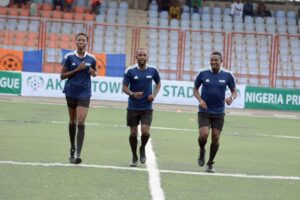 It’s a two-way thing. If you’re doing your part from the league system, the clubs must do theirs too. The salaries of the players are so low that they can go to Benin Republic to go and sign a professional contract. It’s a disgrace.
It’s a two-way thing. If you’re doing your part from the league system, the clubs must do theirs too. The salaries of the players are so low that they can go to Benin Republic to go and sign a professional contract. It’s a disgrace.
I wouldn’t own a Premier League club and my club’s players would be leaving for smaller leagues. That’s why we’re insisting that we have to upgrade the salaries of our players in the league. Secondly, we need to insist that in the few seasons to come the minimum salary of a player in Nigeria is N1 million.
That will stop this unnecessary migration to smaller leagues in Africa. But again, some of these players aren’t educated enough to know the difference between naira valuation and the value of the countries they go to.
For instance if you’re earning N800,000 in Nigeria and you go to another country where you’re offered $1,000, which is N1.5 million in Nigeria. With your $1,000, you’ll be buying things in the value of that country’s currency and it’s different from the Nigerian currency.
Your accommodation and feeding will surpass what you’re paying in Nigeria when you convert it to naira. That’s why after one season some of them come back home after realising that they are not financially better off there. Players need education. Then again, clubs too need to play their part.
What’s your take on the call for there to be an NPFL quota in Super Eagles squads?
Players need to justify their invitation to the national team. You don’t just go to the national team without merit.
You need to be in the category of those the coach feels can play for the national team. At the same time I’ll say yes, we have a lot of Nigerian players in the local league that are qualified to play in the national team.
I watched the Super Eagles against Benin Republic in Cote d’Ivoire in June and I know that there are so many of our home-based footballers that could have played that match and defeated Benin Republic.
The former coach Jose Peseiro was at Onikan to watch our Super Six and said he saw some good players there. Unfortunately, when he was inviting players he invited only two of them. The NPFL was off season when the list of the current squad (for the September AFCON qualifiers) was compiled.
So I wouldn’t challenge it; I believe the next one NPFL players will be involved now that we’ve started the season.
Prominent businessman Tony Elumelu hinted that he could invest or even buy an NPFL club. Do you know if he has made any concrete moves towards this? How do you attract people of his caliber to invest in the league?
He met with the minister. He hasn’t reached out to us. These are the kinds of people we want in the league. The likes of Elumelu, Mike Adenuga, Aliko Dangote, Jim Ovia, Femi Otedola and co.
We want people like them to show an interest in the local league. It will be better for the system because these are people who have successfully run business empires, consistently making profits without issues.
So football business when they come there, it will be like in Nigeria we’re going to have a completely different system. It will be a financially rewarding environment for footballers.
You will not expect an Elumelu to have a football club and the team will be travelling by road from Lagos or Asaba to go and play El-Kanemi in Maiduguri. They will have to fly. These are the kinds of people we want to come into our football ecosystem.
Crowd control problems were a notable negative in a season of positives last term. What are you doing to prevent a repeat of, for instance, the ugly scenes at the potential title-deciding fixture between Rangers and Enyimba in Enugu?
It was quite regrettable. But the thing is we we came in, people hardly came to the stadium to watch NPFL matches. We’ve brought in a system that makes the league look vey credible.
When you go to Kano you see massive crowds at the Sani Abacha Stadium, the same in Gombe, Ibadan and other venues. Even in the night with floodlights you’ll see massive crowds in Ibadan, the same in Enugu.
The problem we’re now having is we didn’t know that the crowds would come so early and crowd control became a problem. This season we’re making arrangements to stem this tide of overcrowded stadiums.
We’ve already told each team how to manage their ticketing so that you don’t have more people than the seating capacity. It’s quite regrettable what happened in Enugu but the truth is that we’re happy that Nigerians are coming.
Before, we were looking for the opportunity to attract crowds. Now we’re looking for a system to ensure crowd control.



